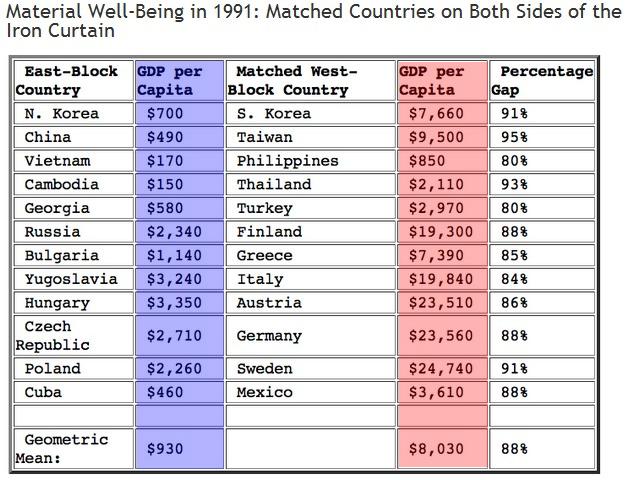How much does the use of markets as a decentralized social planning mechanism for economic life matter? How much richer are we because we live in a market economy rather than in a command-and-control bureaucratic economy?
We are fortunate–if that is the word–to be able to answer this question because the twentieth century provided us with a natural experiment in the form of High Stalinist central planning. Karl Marx, you see, completely missed the utility of markets as devices for providing decision makers with proper incentives and for achieving allocative efficiency. (Why he missed this is, I think, a result of his crazy metaphysics of value, but I won’t go there today.) He saw markets only as surplus extraction devices–ways to quickly and fully separate the powerless from the value that they had created and that ought to have been theirs.
So when the Communists took over, they followed Marx and said: “we don’t want no stinking markets in our economies.” This naturally raised the question of how they were then to coordinate economic activity. And they hit on the clever plan of attempting to reproduce the Rathenau-Ludendorff Imperial German war economy of World War I. And they did so.
In 1989, the Iron Curtain came down, and we could see what a difference it made as we could examine levels of material well-being on both sides of the Curtain. This is as close to a perfect natural experiment as anyone could wish: the Iron Curtain’s location was determined by where Stalin’s and Mao’s and Giap’s armies marched–which is as exogenous to other determinants of economic well-being as anyone could wish.



“If you tell a lie big enough and keep repeating it, people will eventually come to believe it. The lie can be maintained only for such time as the State can shield the people from the political, economic and/or military consequences of the lie. It thus becomes vitally important for the State to use all of its powers to repress dissent, for the truth is the mortal enemy of the lie, and thus by extension, the truth is the greatest enemy of the State.” Joseph Goebbels
“Think of the press as a great keyboard on which the government can play.”
Joseph Goebbels
“Marx===his crazy metaphysics of value”
Marx was not a smart person. What he said wasn’t crazy. It was not thought through. It was simpleton. Somehow the name Marx has attained mythological level in the latter half years of the 20th century. He was a lazy man that benefacted of rich political sponsors. He lived an upper middle class life style with that money. And really, Lenin didn’t follow what Marx said, it appears. It appears that Lenin simply used the name Marx to help in deceiving the peasants so to have power over them. If you want to find a crazy figure in communism look to Lenin. And he was a more frightening and murderous than Hitler.
Market economies are fine as long as they are competitive, not corrupt and monopolistic.
Probably some Government involvement is needed to prevent the latter. Even TR, one of our favorite Republican presidents, thought so.
Our good times in the 1950’s and 1960’s must have reflected our soundest economic strategy.
Or the fact that the other industrial economies got bombed into oblivion in WWII.
TR, one of our favorite Republican presidents
Who is TR? Teddy Roosevelt? If you mean him, he was a popular personality but did not have a true view of America the way the Founding Dads did.
Yeah, but those countries don’t have the likes of Obama, Sunstein, Geitner, and the saviour of the western economies, Harry Reid.